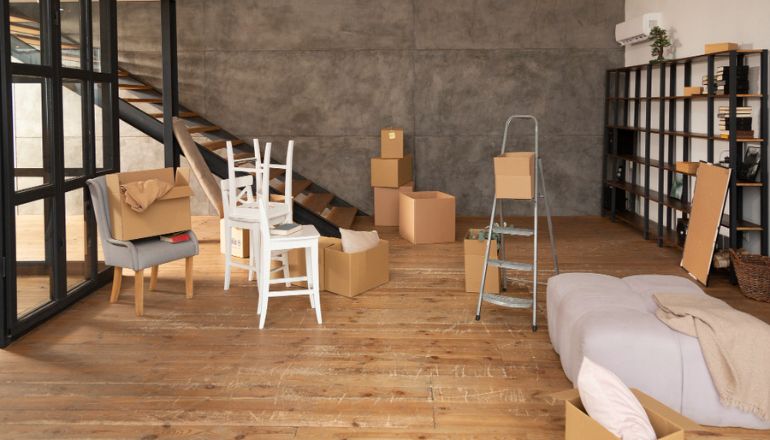How Much Value Does a Finished Basement Add to Your Home?

When considering home renovations, one of the most common questions homeowners ask is, “how much does finishing a basement increase value?” Finishing a basement seems like an easy way to add space and improve your home’s functionality, but is it really worth the investment? The answer depends on various factors like location, market trends, and the quality of the work. But here’s the real challenge: While many homeowners believe a finished basement will automatically boost their property value, the truth is much more complex. Let’s explore whether this renovation is truly worth the money or if it’s just an expensive way to gain extra square footage.
Why Homeowners Finish Their Basements
Finishing a basement is a popular choice for homeowners looking to maximize their living space. It not only enhances the aesthetic appeal of the home but also provides numerous benefits, whether it’s for personal enjoyment or increasing the property’s value.
Common Uses: Office, Gym, Guest Suite, Rec Room
Basements offer versatile options for homeowners to create functional spaces. Here are some of the most common uses:
- Home Office: A finished basement can provide a quiet, private area to work from home, away from the hustle and bustle of the rest of the house.
- Home Gym: With ample space, basements are ideal for setting up a gym, offering a convenient location to work out without taking up space in the main living areas.
- Guest Suite: Many homeowners transform their basements into comfortable guest suites, giving visitors their own space while maintaining privacy for the rest of the household.
- Recreation Room: A rec room in the basement can be an entertainment hub, complete with a TV, games, or a home theater setup, creating an area for relaxation and socializing.
Creating Usable Square Footage
One of the main reasons homeowners finish their basements is to increase usable square footage. By finishing the basement, you add more livable space, which can be used for storage, additional bedrooms, or simply as a place for family to gather. This additional square footage boosts the overall functionality of the home and makes it more appealing to potential buyers, increasing the home’s market value.
The Average ROI of a Finished Basement
Finishing your basement can be a great investment, but it’s essential to understand the return on investment (ROI) you can expect. Here’s what you need to know about the average ROI of a finished basement based on national averages and real estate data.
National Averages and Real Estate Data
According to recent studies and data from the real estate market, the ROI of a finished basement varies, but on average, homeowners can expect to recoup about 70-75% of the cost of finishing a basement when they sell their home. However, this can fluctuate depending on factors such as the home’s location, the quality of the finish, and the overall real estate market at the time of sale. Homes in areas with high demand for extra living space tend to see a higher return on their investment.
Cost vs. Value: What to Expect
When considering the cost of finishing a basement, homeowners typically spend between $10,000 to $50,000, depending on the size of the space, the type of finishes, and the scope of the renovation. The value, however, often exceeds the immediate cost, as the extra square footage and functional space can increase the appeal of the home to potential buyers. While you might not always recover 100% of the renovation cost, the increase in your home’s market value, enhanced functionality, and improved overall appeal can make it a worthwhile investment in the long run.
What Factors Affect the Value Increase?
Several factors influence how much value a finished basement adds to your home. From local market trends to the quality of materials used, understanding these elements will help you make the most informed decision about your basement renovation.
Location and Local Market Trends
The value added by finishing a basement can vary greatly depending on where your home is located. In some markets, additional living space is highly valued, especially in areas where square footage is at a premium. Homes in high-demand neighborhoods or urban areas may see a greater ROI from a finished basement than those in rural or less desirable locations. Additionally, local market trends, such as buyer preferences for additional living space or home offices, can play a significant role in determining the value increase.
Quality of Materials and Design
The quality of materials and design choices you make when finishing your basement will also impact its value. High-end finishes, such as hardwood floors, custom cabinetry, and premium fixtures, can make the space more appealing and add to the overall market value. However, opting for lower-cost or DIY finishes may not provide the same return. A well-designed, functional basement with thoughtful touches will attract more buyers and increase the perceived value of your home.
Permits and Legal Bedroom Count
Another critical factor is whether the finished basement complies with local building codes and regulations. If you’re converting your basement into a bedroom or other living space, it’s essential to obtain the necessary permits. Homes with finished basements that include legal bedrooms can see a significant increase in value because they offer more living space and add to the home’s total bedroom count. On the other hand, unpermitted work can lower the value or even complicate the selling process, as potential buyers may be hesitant about illegal or non-compliant renovations.
Real Estate Insights: What Buyers Look For
When it comes to buying a home, potential buyers often have specific criteria in mind, especially when considering properties with finished basements. Understanding what buyers prioritize can help you maximize the value of your finished basement and attract more interest from prospective buyers.
Basement vs. Main Floor Value
Buyers often value finished basements differently compared to main floor spaces. While main floor living areas are typically seen as more valuable due to their accessibility and central location, finished basements can still add significant appeal. Key points to consider:
- Main floor spaces: Typically more valuable and considered essential for daily living, offering convenience and accessibility.
- Finished basements: Often viewed as bonus spaces, ideal for extra bedrooms, home offices, or entertainment areas. They can enhance the overall functionality of the home but may not always be valued as highly as main floor areas.
Despite this, finished basements can be a strong selling point, especially in homes where space is limited or when the homebuyer needs additional flexible living areas.
How Appraisers Assess Finished Basements
Appraisers play a crucial role in determining the value of a home, including the impact of a finished basement. When assessing a finished basement, appraisers consider various factors such as the quality of construction, its livability, and how it adds to the overall square footage of the home. Appraisers will also look at whether the basement is a legal living space (e.g., a bedroom) and whether it complies with local building codes. While a finished basement may not always be counted as fully equal to above-ground living spaces, it can still significantly increase the appraised value of the property, especially when it’s well-finished and serves a practical function.
Is It Worth It for You?
Deciding whether finishing your basement is worth the investment depends on several factors, including your personal situation, the potential return on investment (ROI), and how it aligns with your long-term goals. Here’s a closer look at how to assess if it’s the right choice for you.
Calculating ROI Based on Your Situation
The ROI of finishing a basement can vary greatly depending on several factors. To calculate how much does finishing a basement increase value, consider the following:
- Location: In high-demand areas, adding square footage with a finished basement can result in a higher ROI, as homebuyers often seek more living space.
- Current Market Conditions: In a seller’s market, where inventory is low, a finished basement may be a more attractive feature, increasing the overall value of your home.
- Cost of Renovation: The cost of finishing a basement can range from a few thousand dollars to tens of thousands, depending on the scope of the project. Compare this cost with the potential increase in your home’s value to determine if it’s worth the investment.
- Purpose of the Space: If the basement will serve as a highly functional space—like an office, gym, or guest suite—it could add significant value by increasing the usable square footage of your home.
When to Renovate Before Selling
If you’re considering selling your home soon, you may wonder whether finishing the basement is worth it. The answer depends on the local real estate market and the current condition of your home. Here are some key considerations:
- If your home lacks space: If your home is small or lacks important features like extra bedrooms or a home office, finishing the basement can make your property more appealing to buyers.
- Timing the renovation: If the cost of renovating is high compared to the potential value increase, it may be better to wait until you’re living in the home long-term, as this allows you to enjoy the space while also adding value over time.
- Market Conditions: In a competitive housing market where buyers are looking for homes with ample space, a finished basement can help your property stand out and may increase its selling price.
Conclusion: Should You Finish Your Basement for Value?
Finishing your basement can be a smart investment, offering additional living space and potentially increasing your home’s value. The key factors in determining whether it’s worth it include your home’s location, the cost of renovation, and the return you can expect. In high-demand markets, a finished basement can add significant value, especially if it serves a practical function, such as an office, gym, or guest suite. However, it’s important to weigh the costs against potential returns and consider the current market conditions. If you plan on staying in the home long-term, a finished basement can enhance your living experience while adding to the overall value. But if you’re preparing to sell soon, carefully evaluate whether the investment will yield the desired return in your specific market.














Really insightful article! I’m curious, do appraisers count a basement bedroom the same way they would an above-ground bedroom when it comes to valuation?
Great timing for this piece—just read that in Toronto, finished basements are now factoring more heavily into appraisals because of rising housing demand. It’s becoming a real selling point here.
I finished my basement last year and turned it into a guest suite plus a small office. Even though I’m not selling anytime soon, it’s added so much usable space for my family and friends. Totally worth it!